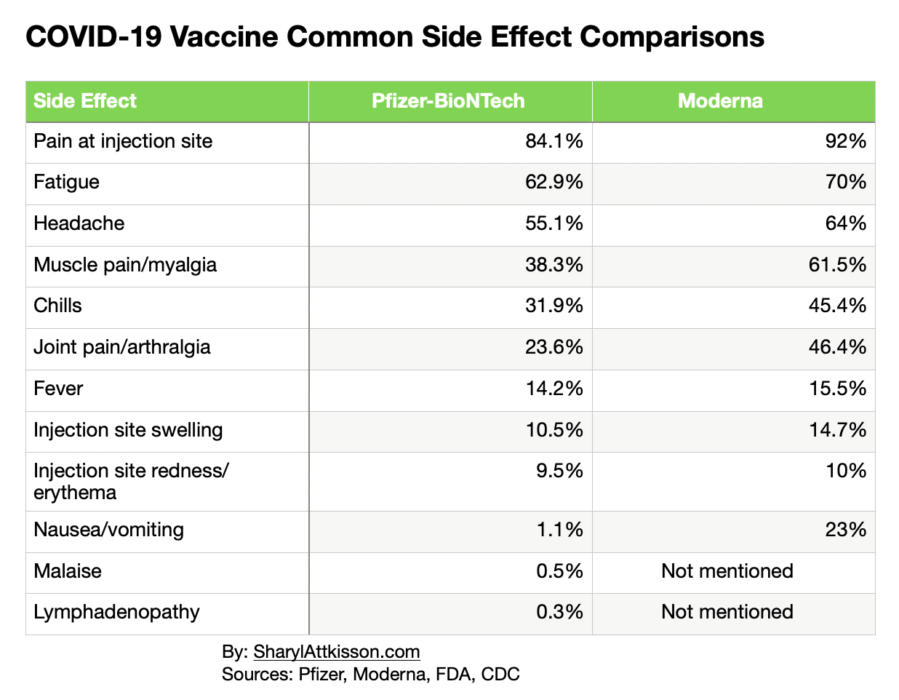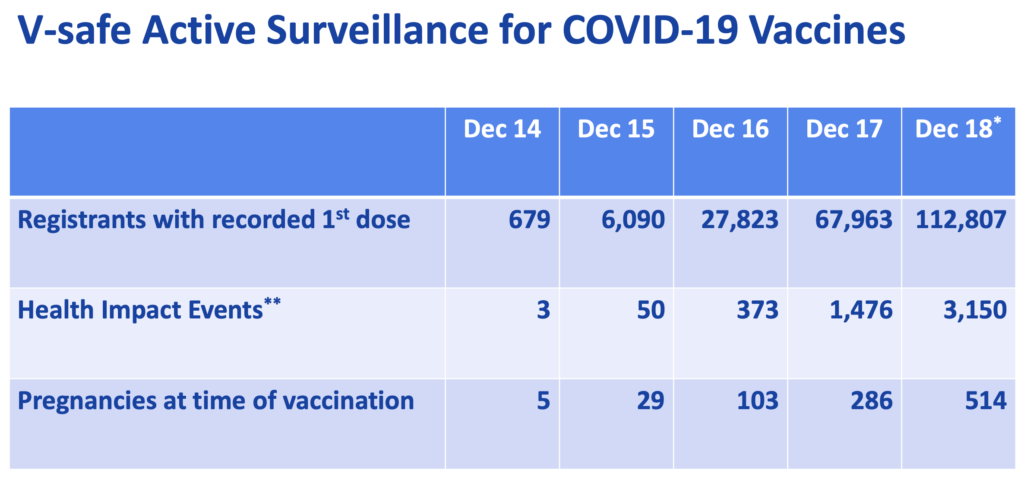All of the data in this post is from CDC, FDA, Moderna and Pfizer.

- Moderna reports significantly higher risk of common side effects
- 5,052 vaccine recipients suffered a “health impact event” as of Dec. 19
- CDC defines “health impact event” as one that renders a patient “unable to perform normal daily activities, unable to work, required care from doctor or health care professional”
- That’s a rate of about 2.3% of vaccine recipients
- CDC says a severe allergic reaction, anaphylaxis, was reported in 6 patients
- Both vaccines are effective at reducing the risk of symptomatic COVID-19 for at least 14 days (Moderna) or more than two months (Pfizer-BioNTech)
- It’s impossible to know how effective the vaccines are beyond the number of days they’ve been given to humans. It’s also impossible to know this soon what are the potential long term side effects, if any.
CDC emphasizes that it believes both of the COVID-19 vaccines approved for emergency use are safe and effective.
The agency is keeping a close eye out for adverse events.
The agency’s “V-safe active surveillance program,” which allows for patients to voluntarily, directly report adverse events outside of the normal VAERS (Vaccine Adverse Event Reporting System), reports that a total of 215,362 people had received their first dose of vaccine as of December 18.
Of that number, 5,052 or 2.3% were reported to have an unspecified “health impact event” defined by CDC as serious enough that they were “unable to perform normal daily activities, unable to work, required care from doctor or health care professional.”

The V-safe surveillance program will help identify as-yet unidentified side effects that won’t be seen until a much larger number of people have taken the vaccine. It will also assist in monitoring for longer term side effects, as yet unknown since the vaccines haven’t been in existence long enough to know. According to CDC, not all vaccine side effects happen immediately after vaccination.
CDC also notes that, as of December 18, it had confirmed six anaphylaxis cases, or severe allergic reaction, following the vaccination.

Source: CDC
Appropriate medical treatment used to manage immediate allergic reactions must be immediately available in the event an acute anaphylactic reaction occurs following administration of the vaccine.
CDC’s Thomas Clark, MD, MPH
The allergic reaction reports prompted CDC to recommend reinforcing measures to recognize, respond to, and report anaphylaxis. The agency also says that “Persons with anaphylaxis following COVID-19 vaccination should not receive additional doses of COVID-19 vaccine.”
CDC reports that as of December 19, 272,001 doses of COVID-19 vaccine had been administered.
Visit CDC.gov for the latest information and recommendations.
Side Effects
Pfizer-BioNTech
According to the FDA, the drugmaker reported the following adverse reactions to the Pfizer-BioNTech COVID-19 Vaccine in clinical studies in test subjects age 16 and over:
- 84.1% Pain at injection site
- 62.9% Fatigue
- 55.1% Headache
- 38.3% Muscle pain
- 31.9% Chills
- 23.6% Joint pain
- 14.2% Fever
- 10.5% Swelling at injection site
- 9.5% Injection site redness
- 1.1% Nausea
- 0.5% Malaise
- 0.3% Lymphadenopathy
Read more at the link below:
https://www.fda.gov/media/144413/download
The Pfizer studies included children as young as age 12, but the adverse events for ages 12-15 are not included in the above figures.
There is no mercury (thimerosal) or any other preservative in the Pfizer-BioNTech COVID-19 Vaccine or MODERNA’s, according to the FDA.
Moderna
According to the FDA, the drugmaker reported the following adverse reactions to the MODERNA COVID-19 Vaccine in clinical studies in test subjects age 18 and over:
- 92% Pain at the injection site
- 70% Fatigue
- 64% Headache
- 61.5% Myalgia
- 46.4% Arthralgia
- 45.4% Chills
- 23% Nausea/vomiting
- 19.8% Axillary swelling/tenderness
- 15.5% Fever
- 14.7% Swelling at the injection site
- 10% Erythema at the injection site
- There were two serious adverse events of facial swelling in vaccine recipients with a history of injection of dermatological fillers
According to Moderna: “Available data on Moderna COVID‑19 Vaccine administered to pregnant women are insufficient to inform vaccine-associated risks in pregnancy. Data are not available to assess the effects of Moderna COVID‑19 Vaccine on the breastfed infant or on milk production/excretion.”
Those who are allergic to any ingredient in a vaccine should not take it, according to CDC.
Ingredients
Pfizer-BioNTech
Each dose of the Pfizer-BioNTech COVID-19 Vaccine also includes: lipids (0.43 mg (4-hydroxybutyl)azanediyl)bis(hexane-6,1-diyl)bis(2-hexyldecanoate), 0.05 mg 2[(polyethylene glycol)-2000]- N,N-ditetradecylacetamide, 0.09 mg 1,2-distearoyl-sn-glycero-3-phosphocholine, and 0.2 mg cholesterol), 0.01 mg potassium chloride, 0.01 mg monobasic potassium phosphate, 0.36 mg sodium chloride, 0.07 mg dibasic sodium phosphate dihydrate, and 6 mg sucrose. The diluent (0.9% Sodium Chloride Injection, USP) contributes an additional 2.16 mg sodium chloride per dose.
Moderna
The Moderna COVID-19 Vaccine contains the following ingredients: messenger ribonucleic acid (mRNA), lipids (SM-102, polyethylene glycol [PEG] 2000 dimyristoyl glycerol [DMG], cholesterol, and 1,2-distearoyl-sn-glycero-3-phosphocholine [DSPC]), tromethamine, tromethamine hydrochloride, acetic acid, sodium acetate, and sucrose.
According to the FDA: It is MANDATORY for vaccination providers to report to the Vaccine Adverse Event Reporting System (VAERS) all vaccine administration errors, all serious adverse events, cases of Multi-inflammatory Syndrome (MIS) in adults, and hospitalized or fatal cases of COVID-19 following vaccination with the Moderna COVID-19 Vaccine.
Effectiveness
Pfizer-BioNTech
Pfizer studies found effectiveness for two months.
Moderna
Moderna studies found effectiveness (reduced risk) of confirmed coronavirus for at least 14 days after the second dose (as of December 17).
CDC notes that “observed outcome of vaccine efficacy at two months does not directly inform vaccine efficacy for any duration longer than two months.” In other words, there is no way to know whether the vaccine is effective for any period longer than the time period it has been given to patients.
CDC information on Pfizer vaccine:
https://www.cdc.gov/vaccines/acip/meetings/downloads/slides-2020-12/slides-12-19/05-COVID-CLARK.pdf
FDA information on Moderna vaccine:
https://www.fda.gov/media/144638/download
https://www.fda.gov/media/144585/download
https://www.fda.gov/media/144637/download
More information from CDC:
https://www.cdc.gov/mmwr/volumes/69/wr/mm6950e2.htm?s_cid=mm6950e2_w
According to the FDA:
WHAT IS THE COUNTERMEASURES INJURY COMPENSATION PROGRAM?
The Countermeasures Injury Compensation Program (CICP) is a federal program that may help pay for costs of medical care and other specific expenses of certain people who have been seriously injured by certain medicines or vaccines, including this vaccine. Generally, a claim must be submitted to the CICP within one (1) year from the date of receiving the vaccine. To learn more about this program, visit www.hrsa.gov/cicp/ or call 1-855-266-2427.

Fight improper government surveillance. Support Attkisson v. DOJ and FBI over the government computer intrusions of Attkisson’s work while she was a CBS News investigative correspondent. Visit the Attkisson Fourth Amendment Litigation Fund. Click here.








